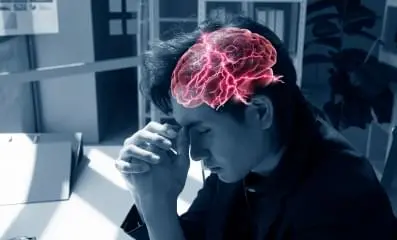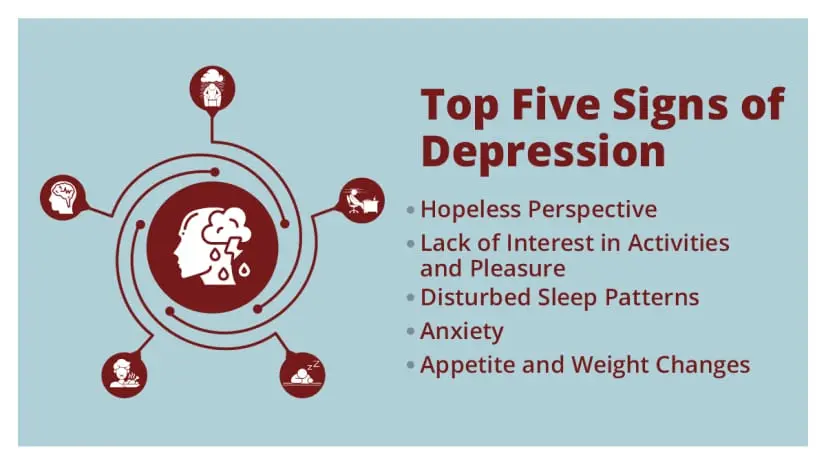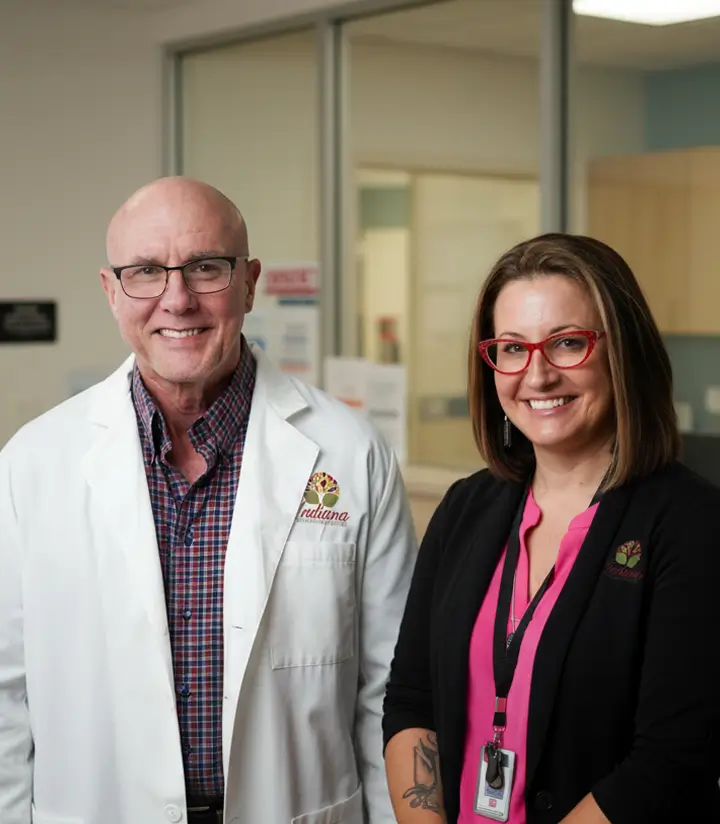
Top 5 Depression Symptoms
Clinically Reviewed by:
If you are in a constant state of sadness and despair, you are probably experiencing depression. You may find yourself struggling to function at work, having difficulty concentrating, sleeping, eating, and even engaging in social activities and hobbies resulting from depression.
Some people may experience depression once during their lifetime. Others may experience it several times. Major depression can be hereditary, or it can even afflict those who have no genetic relations to it. Therefore, it is important to understand the major causes of clinical depression and how to get the best available treatment for you.

Key Takeaways
Depression is a common mental health condition that can be chronic and progressive. Here’s what you need to know:
- Clinical depression affects females (10.3 percent) more than males (6.2 percent).
- People are more prone depressive episodes as they get older.
- The longer depression goes undiagnosed and treated, the more severe and suffering one may experience.
- Depression manifests and varies differently per person.
Indiana Center for Recovery offers mental health care for Hoosiers struggling with depression.
Depression: By The Numbers
According to the National Institute of Mental Health, reports show that clinical depression affects about 8.3 percent of the adult population in the United States. Major depressive episodes were more common to be found in adult females (10.3 percent) compared to males (6.2 percent).
Jackie Daniels, Director of Clinical Development at Indiana Center for Recovery, explained that the reason clinical depression affects females more than males is because of hormonal fluctuations or sudden changes. “The best depression treatments can help reduce the impacts and allow people to resume their lives,” says Daniels.
Recognizing Signs and Symptoms of Depression
It is basic human nature to feel unhappy, lonely, and sad at times. Sadness is a normal, emotional reaction when someone is grieving, having life difficulties, or struggling with low self-esteem. However, if the emotion prevents you from living a regular, active life and becomes overwhelming, causing physical problems and a constant state of despair, then you may be experiencing depression.
At this stage, it is time to seek medical help from a mental health professional. It is important to be able to recognize the signs and symptoms in order to understand when help is needed for mental wellness. “Sadly, over half of those who suffer from depression are never diagnosed or treated,” said Daniels.
Depression varies from person to person. However, there are similar symptoms that indicate when a person is struggling with depression. Daniels expressed the importance of understanding that these manifestations are common during one’s low points. The more signs and symptoms that are noticeable, the more severe the depression may be. Above all, the longer the depression goes undiagnosed and untreated, the more suffering one may experience.
According to Daniels, these are the most common signs and symptoms that indicate when clinical depression:
- Difficulties with concentration, memory, and decision-making
- Constant worry
- Overwhelming feelings of guilt and hopelessness
- Defeatism and despondency
- Insomnia or hypersomnia
- Mood swings or manic episodes
- Irritability
- Loss of interest in previously enjoyed activities
- Loss of libido
- Overeating or lack of appetite
- Body aches and pains, such as headaches and spasms
- Digestive issues
- Constant feelings of sadness, restlessness, or emptiness
- Suicide attempts or suicidal thoughts
Top Five Signs of Depression
According to Jackie Daniels, these are the top five indicators to look out for and recognize if you or your loved one is clinically depressed.
Hopeless Perspective
Major depressive disorder is a mood disorder that can affect the way a person may feel about their life and the people around them. The most common symptom of depression is that it has the tendency to enable a gloomy or powerless attitude accompanied by feeling meaningless, self-hatred, or unnecessary guilt. Daniels gives primary examples of how one may say, “It’s all my fault” or “What is there left to do?” which are common, recurrent depressive thoughts.
Lack of Interest in Activities and Pleasure
Depression can make it difficult for a person to appreciate what they enjoy. Another indicator of depression is a lack of interest in activities an individual formerly enjoyed, such as athletics, hobbies, or social gatherings with friends and families. Sex is also another avenue where one could lose interest. “Reduced sex drive and even impotence are common symptoms of serious depression,” says Daniels.
Disturbed Sleep Patterns
According to Daniels, exhaustion may lead to depression, which may lead to anxiety, which may lead to insomnia. When a person is depressed, they often have trouble sleeping. By adding anxiety into the mix, it can make matters worse, causing insomnia.
Anxiety
Daniels states that there is no scientific evidence as of yet that proves depression induces anxiety. However, she expresses how the two disorders commonly coexist. Feelings of nervousness, agitation, and tension are all symptoms of anxiety. Individuals may also feel a sense of danger, fear, or dread.
Anxiety can also cause the heart rate to elevate and rapid, shallow breathing. One may also experience severe sweating, trembling, and muscle spasms. “You could find it extremely difficult or harder to concentrate or think clearly about anything other than the problem you’re worried about at that moment,” said Daniels.
Appetite and Weight Changes
People with depression may show extreme or sudden changes in their appetite and weight, whether it be increased or decreased. Daniels explains how this can result from their own self-esteem, causing them to have severe weight fluctuations within weeks.
“If this is the case, their intentionality could be a result of how they feel about themselves or what’s going on in life, which would lead to more severe weight fluctuations than someone without these issues might otherwise experience over time,” says Daniels.
Top Causes of Depression
What are the main causes of clinical depression? Several risk factors can cause clinical depression and may even occur sporadically. Daniels broke down the top risk factors that may cause depression.
A traumatic life event or a combination of several distressing events can cause depression. Examples include:
- Bereavement
- Bankruptcy
- Sickness
- Unemployment
- Work or money concerns
A “descending spiral” of events can cause distress, which can lead to major depressive disorder. Also, Daniels explains how people are more prone to experience depressive episodes with age as well as those who are in difficult social and economic situations.
Additionally, natural brain chemicals, called neurotransmitters, also play a role in depression. Using drugs or alcohol can disrupt the natural chemicals and the brain’s function system and can potentially cause depression. “Changes in the functioning and action of these chemicals and how they connect with neural circuits important in maintaining mood consistency have recently been discovered to have a role in depression and its therapy,” said Daniels.
Changes in the body’s hormone production are also a factor that can cause depression. Examples of sudden hormone changes that may cause depression are pregnancy and childbirth. These hormonal changes not only cause mental health concerns but also physical concerns such as thyroid disorder, menopausal stages, and other diseases.
Best Treatment for Depression
Depression is treatable and manageable with lifestyle modification, treatment, and medication. According to Daniels, the type of depression treatment needed varies from mild to severe. Here is the breakdown of the different categories for depression treatment.
Mild Depression Treatment
If you have mild depression, your doctor may suggest waiting and see if the depression goes away on its own while monitoring and tracking your improvement. Daniels says this is a form of treatment called “watchful waiting.” She explains how it is recommended to make lifestyle changes that include exercise and self-help organizations.
Moderate Depression Treatment
Moderate depression is when the mild depression does not resolve and stays persistent. Treatment of this type often includes a combination of behavioral therapies and antidepressants. Your doctor may also recommend other forms of therapy sessions.
Severe Depression Treatment
This type of treatment often consists of therapy and medication. You may be sent to a mental health doctor for more in-depth therapy services and medication. Your doctor may also closely monitor and increase your dosage to see if the situation improves.
Frequently Asked Questions (FAQ)
Is depression a chemical imbalance?
Yes. Depression can occur from being chemically imbalanced from the mood regulation in the brain. Other factors that may cause depression are genetics and stressful or traumatic life events.
Does depression go away on its own?
Sometimes, but not always. Even though depression can go away on its own without treatment, there is no guarantee that it will not get worse over time. If you are experiencing depression, it is recommended to see a doctor if your life is being affected.
Overcoming Depression at Indiana Center for Recovery
If you’re experiencing persistent sadness, loss of interest in activities, sleep disturbances, anxiety, or appetite changes, these may be signs of depression that warrant professional support. Indiana Center for Recovery provides evidence-based treatment for depression, helping you manage symptoms and improve your quality of life.
Our mental health treatment include therapy approaches like cognitive behavioral therapy and medication management to help you address depressive symptoms and develop healthier coping strategies.
When symptoms require intensive support, our inpatient psychiatric care provides stabilization and comprehensive treatment in a structured environment. For those with co-occurring substance use concerns, our integrated dual diagnosis treatment addresses both depression and substance use together for better outcomes.
Find expert depression treatment at our mental health treatment centers across Indiana. Call (844) 650-0064 to learn how we can help you manage depression symptoms and take steps toward improved mental well-being.






 100% Confidential
100% Confidential
